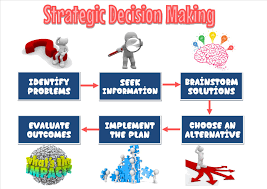Decision-Making Questionnaire: Evaluating and Areas for Improvement

In this essay, we will evaluate the results of a Decision-Making Questionnaire (DMQ) and identify my areas of strength and improvement based on the provided questionnaire responses that I gave. As it is known, Decision-making plays a vital role in our daily lives, inducing the outcomes we experience and the paths we choose. Understanding our decision-making style is essential for personal growth and improving our ability to make effective choices.
Evaluation of Decision-Making Questionnaire Results
The DMQ provided a set of statements related to decision-making, and respondents were asked to rate the frequency of each statement’s applicability on a scale of 1 to 6. By assessing my responses, we can gain insights into different dimensions of decision-making style. Could we look at each extent and its relevance to the questionnaire responses I gave?
Decision-Making Questionnaire Results for Thoroughness:
Thoroughness in decision-making refers to bearing in mind all implications and evaluating the pros and cons before coming to a decision. Based on the questionnaire responses that I gave, I tended to consider all impacts (Q9, Q13, Q19) and preferred a thoughtful, logical decision-making process (Q21). This suggests that I value a careful and inclusive approach when making choices.
Decision-Making Questionnaire Results for Control:
The control dimension mirrors a sense of control over the decision-making progression. My response in (Q1, Q6) shows that I feel in control and remain calm when making decisions quickly(Q6). This suggests that I have a level-headed tactic to decision-making and the ability to uphold self-possession during time-sensitive situations.
Decision-Making Questionnaire Results for Hesitancy:
Hesitancy refers to having difficulty settling on a particular option or changing one’s mind. In (Q10), the questionnaire responses indicate that I often change my mind and hesitate (Q11, Q14). This suggests that I may benefit from developing a more decisive approach to decision-making.
Decision-Making Questionnaire Results for Social Resistance:
Social resistance is the inclination to depend on judgment rather than seeking advice or considering others’ opinions. The responses indicate that I frequently make decisions based on my assessment (Q17) and infrequently seek advice (Q18). While independence can be valuable, balancing individual review and incorporating external perspectives is essential.
Decision-Making Questionnaire Results for Optimizing:
Optimizing refers to the tendency to continue searching for better options even after finding a satisfactory one. The questionnaire responses indicate that I seek something better (Q15) rather than settling for a course of action that is just about okay. While this trait demonstrates a drive for excellence, ensuring that the search for improvement helps in timely decision-making is essential.
Decision-Making Questionnaire Results for Principled:
The moral dimension evaluates the level to which practicalities outweigh personal ideals in decision-making. The responses suggest that I frequently prioritize models over practical difficulties (Q8, Q20). While principles are essential, practical considerations and balancing personal values are necessary to ensure effective decision-making.
Decision-Making Questionnaire Results for Instinctiveness:
Distinctiveness refers to depending on gut feelings when making decisions. The questionnaire responses indicate I only occasionally count on gut feelings (Q2) and infrequently stick to their initial choices (Q4). This suggests I rely less on intuition and prefer re-evaluating decisions based on additional information or analysis.
Areas for Improvement from Decision-Making Questionnaire Results:
Based on the evaluation of the questionnaire responses, there are a few areas where I might consider improving my decision-making style:
- Developing decisiveness: Addressing hesitancy (Q10, Q11, Q14) and reducing frequent changes of mind (Q10) can enhance my ability to make timely decisions.
- Seeking diverse perspectives: While it is important to trust one’s judgment, incorporating advice and diverse viewpoints (Q18) can provide valuable insights and improve the quality of decisions.
- Balancing principles and practicalities: Finding a balance between personal ideals and practical considerations (Q8, Q20) can lead to more effective decision-making outcomes.
Understanding our decision-making style is crucial for personal and professional growth. By estimating the results of the Decision-Making Questionnaire, we have identified areas of strength and areas for improvement. Building upon strengths such as thoroughness, control, and remaining calm under time limitations can enhance decision-making. Improvements include seeking diverse perspectives, developing decisiveness, and balancing personal ideals and practical considerations. By being aware of these areas and actively working on them, individuals can refine their decision-making skills and make more knowledgeable and effective choices in various aspects of their lives.
References for Decision-Making Questionnaire
Harvard Business Review: The HBR website offers a wide range of articles and resources on decision-making, including tips for improving decision quality and avoiding common pitfalls. You can explore their collection here: https://hbr.org/topic/decision-making
MindTools: MindTools is an online platform that offers practical tools, articles, and resources to enhance decision-making skills. They guide decision trees, SWOT analysis, and rational decision-making techniques. You can check out their decision-making section here: https://www.mindtools.com/pages/main/newMN_TED.htm.





